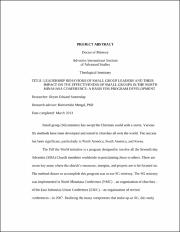| dc.description.abstract | Small group (SG) ministry has swept the Christian world with a storm. Various SG methods have been developed and tested in churches all over the world. The success has been significant, particularly in North America, South America, and Korea.
The Tell the World initiative is a program designed to involve all the Seventh-day Adventist (SDA) Church members worldwide in proclaiming Jesus to others. There are seven key areas where the church’s resources, energies, and prayers are to be focused on. The method chosen to accomplish this program was to use SG ministry. The SG ministry was implemented in North Minahasa Conference (NMC)—an organization of churches— of the East Indonesia Union Conference (EIUC)—an organization of several conferences—in 2007. Realizing the many components that make up an SG, this study
chose to analyze the leadership aspect of the SG, more particularly the leadership behaviors of the SG leaders and its impact to the effectiveness of SGs since 2007 to 2011.
The primary purpose of the study was to identify the leadership behaviors that would be expected from SG leaders. To achieve that, the study examined the biblical foundations of SGs by exploring the various images of small groups in the Bible and the leadership behaviors of their leaders. The textual component of the study described the historical and cultural aspects of the Minahasa people and how it affected the SGs. It presented the cultural factors that affected the members’ and leaders’ attitude towards SGs.
The study employed two survey questionnaires to measure the perceptions of SG members on the leader’s leadership behaviors and effectiveness of the SGs. Purposive sampling method was used to determine the respondents. Finally, the data was analyzed by SPSS software using descriptive statistics, ANOVA, Pearson’s correlation and multiple regressions.
The findings showed that there were five predominant leadership behaviors and that leadership behaviors do have an impact to the effectiveness of the SGs. There were six predictors that entered for SG effectiveness considering leadership behavior and the demographics. Other findings revealed the members’ perception that SGs are centers of community, training, and spirituality. The conclusion of the study highlighted the importance of creating an SG leader’s training program in order to have effective SG leaders that will lead effective SGs. Such SGs can function more effectively and create a difference in the church community. It also provided some recommendations for the leadership of the church in NMC and in EIUC. | en_US |

